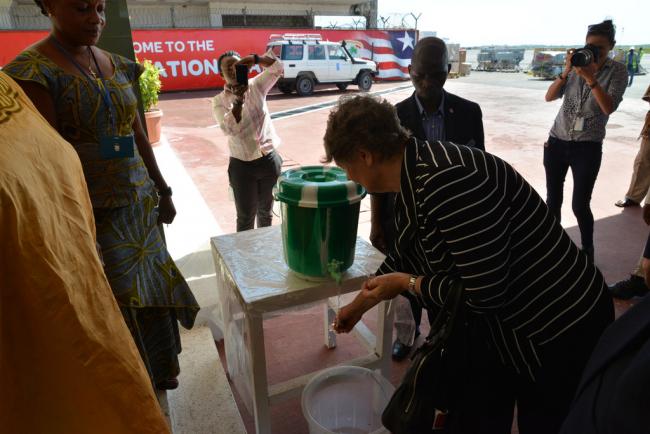
Ebola: UN health agency turns to foreign medical teams in last phase of combat against virus
Meanwhile, UN Development Program (UNDP) Administrator Helen Clark arrived in Monrovia, Liberia, as part of her visit to West Africa focusing on Ebola-recovery, saying: “Ebola is very hard to beat, but it's being beaten in Liberia.”
Earlier, Miss Clark met with a number community groups in Conakry, Guinea, where she stressed the vital importance of community advocacy in stopping the outbreak. Her mission will conclude with a visit to Sierra Leone early next week.
UNDP is working with the national authorities and local, regional and international partners, including the African Development Bank, the European Union and the World Bank, on an Ebola Recovery Assessment, and in support of national strategies, as part of its mandate to the lead the UN system in the Ebola-related recovery efforts.
The World Food Programme (WFP), meanwhile, stressed the need to support communities once they are Ebola free. WFP is providing these communities with three months of food assistance so they can restart their livelihoods, and it is also supporting local markets and economies by purchasing local products.
WFP has forged a new partnership with WHO to support health workers in getting to zero cases by providing operational support to 63 field surveillance sites, some deep in the jungle.
In Geneva, Dr. Ian Norton, who heads WHO’s medical team in West Africa tackling Ebola, told reporters that during the technical meeting from 17 to 19 February, options would be discussed on how foreign medical teams could get involved with other pillars of Ebola-response, including surveillance and social mobilization.
“Many of the teams were ready to stay for several months in order to safely reactivate the essential healthcare services of the three affected countries,” according to Dr. Norton. “A specific section of the meeting would look at improved safety and improved patient care.”
He described foreign medical teams as clinical providers – doctors and nurses – coming from outside of their countries of origin into a country with a health emergency.
There were currently 58 such medical teams working at 66 Ebola treatment centres in the infected areas in West Africa. They were provided by some 40 different organizations dealing with the Ebola response, according to WHO.
Dr. Norton said the foreign medical teams had been part of a “fire-fighting stage of the response” when the lack of clinical capacity was hampering the rest of the response.
He noted that the focus now was on the public health stage, with a view to bringing the number of cases down to zero.
The latest WHO statistics show that nearly 23,000 people have been affected by Ebola with more than 9,200 deaths.
WHO also reported that despite improvements in case finding and management, burial practices, and community engagement, the decline in case incidence has stalled.
In other news the UN Population Fund (UNFPA) said that more than $56 million is urgently needed to provide vital reproductive, maternal and newborn health services in Guinea, Liberia and Sierra Leone.
This amount, according to the agency, will cover the initial six months of the UNFPA-led Mano River Midwifery initiative – a new Ebola-response effort that would increase the number of health workers to ensure that women and girls of childbearing age stay healthy and safe despite the crisis. The funds will also cover the cost of contact-tracing to identify all potential contacts of Ebola cases and help prevent infections.
“Our response is urgent as we have to save lives and stop the spread of Ebola now,” said UNFPA Executive Director, Dr. Babatunde Osotimehin in a press release. “We must also strengthen health systems and build resilience for the future. By expanding midwifery, we will increase the number of health workers and ensure safe delivery for mothers and newborns.”
Photo: UNDP/Dylan Lowthian
Support Our Journalism
We cannot do without you.. your contribution supports unbiased journalism
IBNS is not driven by any ism- not wokeism, not racism, not skewed secularism, not hyper right-wing or left liberal ideals, nor by any hardline religious beliefs or hyper nationalism. We want to serve you good old objective news, as they are. We do not judge or preach. We let people decide for themselves. We only try to present factual and well-sourced news.







